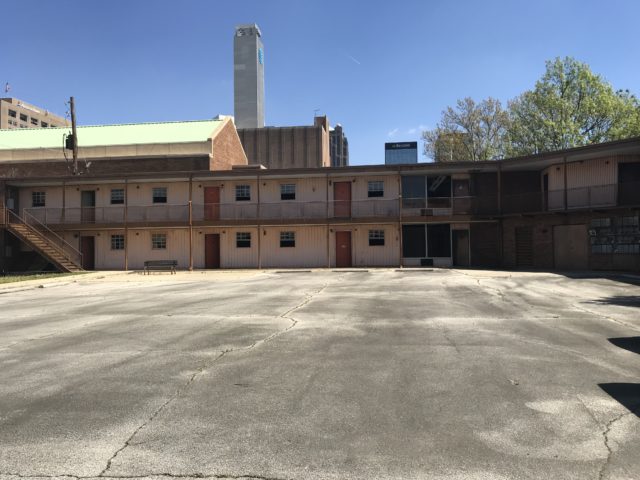By Erica Wright
The Birmingham Times
Exterior renovation of the historic A.G. Gaston Motel in downtown Birmingham could begin as soon as June, city officials said Wednesday.
That phase of the project is expected to cover the wing of the motel where Dr. Martin Luther King Jr. stayed in Room 30 and also cover the motel’s entire roof.
“The A.G. Gaston Motel is sacred ground…we are investing in this project because this is the site of freedom—a freedom that changed our city, our nation, our world,” said Mayor Randall Woodfin during a press conference in the abandoned motel’s courtyard. “The fight for social justice, racial equity and economic prosperity in our country continues. The A.G. Gaston Motel will continue to stand as a symbol of change.”
Named after the prominent Birmingham business man, Dr. Arthur George Gaston, the A.G. Gaston Motel was constructed in 1954 to provide higher-class service to black visitors in the midst of the city’s decades of strictly segregated business and recreation. The motel also served as a home for countless Civil Rights Movement leaders, serving as a meeting place when they traveled through Birmingham.
During the spring of 1963, King stayed in Room 30—a “War Room”– for the movement’s top leaders. It was in Room 30 where Dr. King decided to defy a court injunction and submit himself to being jailed as a show of solidarity with local protesters, a move which would lead to his famous “Letters from a Birmingham Jail.”
The first phase of the A.G. Gaston Motel is currently under way and once that assessment, known as a “mock-up,” is completed in June the exterior renovation is expected to begin.
“This is an extremely important and special project,” said Jack Pyburn, preservation architect for the project. “It’s not only important to Birmingham, but it’s important internationally.”
The second phase, which will take a year, covers the exterior and interior, the courtyard, landscaping, the restaurant, sign and remaining areas, Pyburn said.
The entire $10 million project is scheduled to be completed in 2021 and the goal is to restore it to its original 1960’s look and feel, officials said.
“The goal when we’re finished is that when someone comes in here, they have a sense- even without a lot of interpretation- of experiencing what it was like when the campaign was planned,” said Pyburn.
Woodfin added, “I don’t think we can really appreciate Room 30 and what took place in that room from a strategic standpoint, from a planning standpoint… when you think about the results of the movement and the planning that took place, part of that success is because of what the motel provided. There wasn’t a lot of places that provided a safe haven, or a place for planning that people could feel that they could be open to an idea of how to fight against oppression.”
Longtime Coming
City Council President Valerie Abbott said the project was a longtime coming.
“I have been on the council for 17 years and we have talked about this since Year One so 17 years later, and we are finally here . . . it’s great that we are preserving this monument for freedom, this monument to the struggle of so many who sacrificed so much so that we can all be standing here today in a preservation moment rather than a demolition moment.”
Odessa Woolfolk, founding president and chair emerita of the Birmingham Civil Rights Institute, and who has been a long-time advocate for the restoration of the hotel, said, “there are two kinds of things we think of when we’re here. We think of a struggle, which is universal, the impact of it and we’re talking about what we can learn from that precious moment in time and we think about it from the economic aspect of this place.
“A.G. Gaston said a part of what you earn is to keep and that is a spirit that we can help inculcate that in future generations and young people. When they come here, yes, we will reminisce about the past but that’s only because the past is a spring board to a greater future for future generations.”
The motel closed in the late 1970s and sat vacant for more than 20 years, but in 2016 the city deeded over a portion of the property to the National Trust for Historic Preservation for the purpose of establishing a Birmingham Civil Rights National Monument. In January 2017, President Barack Obama designated the Birmingham Civil Rights District as a national monument.
After the A.G. Gaston Motel site is restored, it will be annexed by the Birmingham Civil Rights Institute and will become the new Freedom Center, an educational hub that will focus on the Civil Rights Movement and other cultural topics.
Gaston Stories
Woodfin also announced a campaign, Gaston Stories, where people can send in their memories of the hotel. Between March 27 and May 15, the mayor is encouraging people to submit their memories, including photos of their time at the motel to gastonstories@birminghamal.gov.




